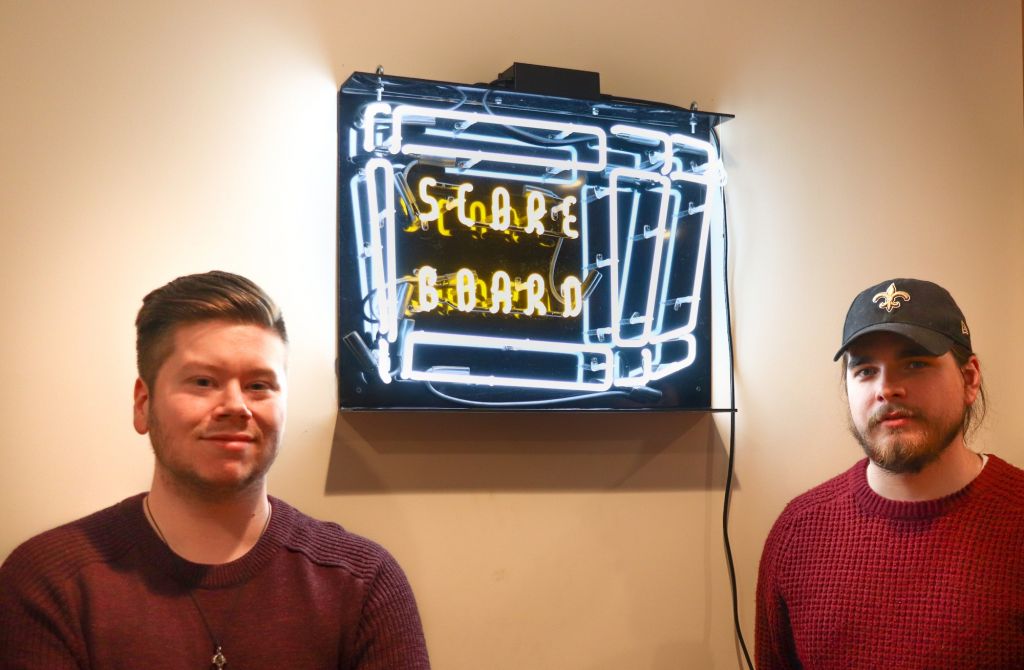A neon sign that reads ‘Scoreboard’ beckons a visitor to pass through a mysterious door.
It might be the last thing anyone would expect to find in a basement accessed through the garage of a massive cottage. But a cozy recording studio filled with instruments and friendly faces awaits whoever decides to enter.
Will Brisebois and Will Lepine – both 2015 graduates of Algonquin’s music industry arts program – are the proud owners of the professional basement studio located in rural Kanata which offers a variety of services including recording, mixing and mastering.
Although they met during their time at Algonquin, Lepine and Brisebois only started bonding near the end of the program when their class went on a trip to the Canadian Music Week conference in Toronto. During their time there, they bonded over their love for sports – hence the name Scoreboard Recordings – and their love for music.
Having kept in touch after graduation, Lepine and Brisebois started chatting about opening their own studio.
“I think we started talking about doing this more after the program,” Lepine said. “We were hanging out and we talked about it a bit and decided, you know what? Let’s dive in, let’s do it.”
One of the first big expenses for the duo was the purchase of a computer that would serve as one of their main tools.
“Bought a Mac so there’s no going back,” Lepine said with a laugh. “We spent $3,000 on this thing so we can’t back out now.”
Although it may seem like Lepine and Brisebois decided to open their studio on a whim, their approach was very cautious and well thought out.
“We pretty much started setting this up almost a year and a half before we actually launched the studio,” Lepine said. “We spent that whole time game planning, figuring out our branding and spending tons of money on equipment.
“We really wanted to invest and make a nice place before really launching full time.”
Their measured approach combined with their decision to form a partnership is part of the reason why the co-owners believe they can offer a better experience than an amateur basement studio.
“A lot of people start out a studio by themselves so it’s a very slow growth; you have to buy a computer, an interface, some microphones…So as a partnership, it makes the cost easier to manage,” Lepine said.
With their partnership helping ease the cost of equipment, Lepine and Brisebois are using their resources and experience in order to reach new heights.
“In such an over-saturated industry where everyone has the ability to offer a cheap product, we offer something above that,” Brisebois said. “We want to be rivaling commercial studios, we want to be pushing the boundaries.”
Lepine then added that, while you need to have aspirations to be successful, you have to put in the work to back it up.
“You need the sample work to start,” Lepine said. “You can’t start off and be like ‘Oh okay, gives us $400 a song or $80 per hour’ no, you need to build your way up there.”
Colin Mills, current teacher and program coordinator for the music industry arts program, agrees that forming a solid partnership is a winning method.
“I think two people joining forces makes a lot of sense. You’re not only pooling your resources and your equipment, but your knowledge and your time.”
Mills had a lot of praise for Lepine and Brisebois as they’ve had a positive impact on the music industry here in Ottawa.
“Not everyone can do what they have done. I mean, they started their own company, they’re out there on social media, they’re out there working with artists…I’ve talked to people who have recorded with them and they had a great experience,” Mills said.
Both Lepine and Brisebois took away some helpful information during their time at Algonquin.
While reflecting on his time in MIA, Lepine said that the program changed his perception of the music industry. Having toured and recorded with bands before enrolling, he already had an understanding of the craft.
Combining his previous knowledge with his experience and newfound perspective prepared him for this business venture.
Conversely, Brisebois couldn’t see himself being in this position without his experience at the college.
“That was my introduction to recording, mixing and all that so definitely without that [the MIA program], I would not have gone down this path.”
One thing the MIA program tries to teach its students is not to undervalue their worth. Lepine and Brisebois have made sure to follow that advice.
“One of the toughest things to do when you’re starting out in this is you’re still battling your own self-worth,” Brisebois said. “Once you get through the processes a few times, you get used to the amount of work and you can start to gauge everything. You start to realize that there’s a value to what you do.”
With their humble attitude and strong work ethic acting as their main driving force, Lepine and Brisebois are excited to see what will come next. Trying to enjoy their progress while staying in the moment, the duo are focussed on the work at hand.
“Keep on trucking,” Lepine said with a chuckle.
“Remain ‘truculent’,” Brisebois added with a grin.


